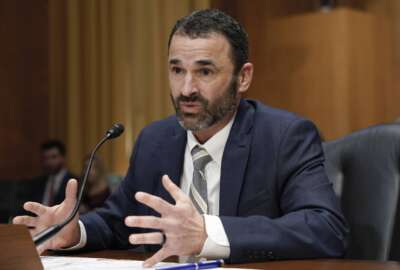Hubbard Radio Washington DC, LLC. All rights reserved. This website is not intended for users located within the European Economic Area.
On Air: Federal News Network
Trending:
Bill tracker: Proposals affecting fed pay, benefits and more
Federal News Radio tracks the bills that take aim at federal employees\' pay and benefits.
Several bills making their way through Congress take aim at federal employees’ pay and benefits as a way to tighten the government’s budget belt. Feds already face a two-year pay freeze. A couple of the proposals would extend that freeze beyond 2012.
This page will be regularly updated. Check back for status changes and the addition of new bills.
(Last updated on Dec. 15.)
| Impact on feds | Description | Bill/Sponsor(s) | Status |
|---|---|---|---|
| CUTS FEDERAL WORKFORCE BY 10 PERCENT | Cuts workforce through attrition to avoid defense spending cuts. Read full story. |
H.R.3662 Rep. Buck McKeon (R-Calif.) |
Introduced on Dec. 14, 2011. |
| PAY FREEZE, CUT WORKFORCE BY 15 PERCENT | Extends pay freeze, including bonuses, through 2014. Read full story. |
S.1476 Sen. Orrin Hatch (R-Utah) |
Referred to Senate Homeland Security and Governmental Affairs Committee on Aug. 2, 2011. |
| PAY FREEZE, CUT WORKFORCE BY 10 PERCENT | Extends pay freeze through 2015 and cuts workforce. | S.1931 Sen. Dean Heller (R-Nev.) |
Rejected by Senate on Dec. 1 |
| FEDERAL WORKERS COMP REFORM | Streamlines claims process. Covers injuries sustained in a terrorist attack as a “war-risk hazard.” Read full story. |
H.R.2465 Rep. John Kline (R-Minn.) |
Passed House and referred to Senate Homeland Security and Governmental Affairs Committee on Nov. 30, 2011. |
| BENEFITS TO SAME-SEX COUPLES | Extends benefits to same-sex partners of federal employees. Read full story. |
S.1910/H.R.3485 Sen. Joe Lieberman (I-Conn.), Rep. Tammy Baldwin (D-Wis.) |
Referred to Senate Homeland Security and Governmental Affairs Committee and House Committee on Oversight and Government Reform on Nov. 18, 2011. |
| FAST-TRACKS PRESIDENTIAL APPOINTMENTS | Eliminates Senate approval for some high-level federal positions. Read full story. |
S.679 Sen. Charles Schumer (D-N.Y.) |
Held at desk on July 1, 2011. |
| CUT WORKFORCE BY 10 PERCENT | Limit the number of employees starting in fiscal 2015 to 90 percent of the total as of Sept. 30, 2011. Read full story. |
H.R.2114 Rep. Darrell Issa (R-Calif.) |
Referred to House Subcommittee on Federal Workforce, U.S. Postal Service, and Labor Policy on June 20, 2011. |
| HIRING FREEZE | Freeze hiring across the government until the deficit has been eliminated. Freeze exempts USPS, law enforcement and transitional positions. Read full story. |
H.R.1779 Rep. Thomas Marino (R.-Penn.) |
Referred to House Subcommittee on Federal Workforce, U.S. Postal Service, and Labor Policy on May 13, 2011. |
| 3-YEAR PAY FREEZE
WORKFORCE CUTS |
– Extends the federal pay freeze for another year, through fiscal year 2013. This means your pay would remain at fiscal year 2010 levels through Sept. 30, 2013. – Cuts federal workforce by 10 percent no later than October 1, 2020. |
H.R.235 Rep. Kevin Brady (R-Texas) |
Referred to to House Subcommittee on Insurance, Housing and Community Opportunity on March 23, 2011. |
| FURLOUGH | Requires federal employees to take two weeks of mandatory, unpaid furlough during fiscal year 2012. Read full story. |
H.R.270 Rep. Mike Coffman (R-Colo.) |
Referred to House Subcommittee on Courts, Commercial and Administrative Law on Feb. 14, 2011. |
| 5-YEAR PAY FREEZE
WORKFORCE CUTS SPENDING FREEZE |
– Cuts federal workforce by 15 percent. – Freezes federal pay through fiscal year 2015. – Freezes non-discretionary spending at 2008 levels through fiscal year 2021. |
H.R.408/S.178 Rep. Jim Jordan (R-Ohio), Sen. Jim DeMint (R-S.C.) |
House bill referred to Subcommittee on Capital Markets and Government Sponsored Enterprises on March 23, 2011. Senate bill referred to Committee on Finance on Jan. 25, 2011. |
| PENSION CUTS | Ends defined benefits pension portion for new hires starting in 2013. The Thrift Savings Plan and retirement benefits will not be affected by this bill. Read full story. |
S.644 Sen. Richard Burr (R-N.C.) |
Referred to Senate Committee on Homeland Security and Governmental Affairs on May 9, 2011. |
| SPENDING CUTS | Cuts spending by $500 billion in fiscal year 2011. Among the agencies that would see appropriations cuts under this bill are Defense, Homeland Security, Commerce, Health and Human Services, Energy, National Institutes of Health and more. Some programs would be entirely defunded, including the Government Printing Office, all Department of Education programs, except the Pell grant program, and all Department of Housing and Urban Development programs, except veteran housing programs. | S.162 Sen. Rand Paul (R-Ky.) |
Introduced to Senate on Jan. 25, 2011 |
| REMOVAL OF DOD RAISES FOR BAD PERFORMANCE | Restricts the payout of annual adjustment and locality pay for civilian DoD employees performing “unsatisfactory work.” West says the bill would generate approximately $21 million in savings while increasing productivity in the workforce. “As employees become more satisfactory in future years, the savings would be approximately $80 million through FY16,” according to West’s website. | H.R.1248 Rep. Allen West (R-Fla.) |
Referred to HouseCommittee on Oversight and Government Reform on March 29, 2011. |
| IMPROVE VETERANS’ JOB TRAINING | Gives grants to nonprofits that offer veteran job training. Makes the Transition Assistance Program mandatory for military personnel becoming civilians. | H.R.1941 Rep. Sanford Bishop (D-Ga.), S.951 Sen. Patty Murray (D-Wash.) |
House committee hearings held on July 15, 2011. Report filed to Senate VA Committee on July 18, 2011. |
| 1.6 PERCENT MILITARY PAY RAISE | Provides a 1.6 percent increase in military basic pay. Prohibits TRICARE Prime fee increases for one year, according to the House Armed Services Committee. | H.R.1540 Rep. Buck McKeon (R-Calif.) |
Referred to Senate committee on June 6, 2011. |
| PROTECT MILITARY PAY IN SHUTDOWN | The bill ensures both active-duty and reserve military personnel are paid on time if there is a shutdown. A DoD memo states all military personnel would have to work without pay in a shutdown until Congress makes appropriations to pay military personnel for the time worked. Read full story. |
H.R.1297 Rep. Louie Gohmert (R-Texas) |
Motion to Discharge Committee filed by Gohmert on July 14, 2011. |
| REDUCE DRUG COSTS | – Requires greater transparency over pharmacy benefit managers in the Federal Employees Health Benefits Program (FEHBP). – Prohibits a drug carrier from paying a pharmacy benefit manager more than the average manufacturer’s price for any drug. Read full story. |
H.R.979 Rep. Stephen Lynch (D-Mass.) |
Referred to House Committee on Oversight and Government Reform on March 9, 2011. |
| TELEWORK TAX CREDIT | Provides a tax credit, up to $1,000 per year, for teleworking expenses. Read full story. |
H.R.710 Rep. Robert Whitman (R-Va.) |
Referred to House Committee on Ways and Means on Feb. 15, 2011. |
| CHANGES FEGLI PAYMENTS TO LUMP-SUM | Changes the default payments for the Federal Employees Life Insurance Program (FEGLI) to a lump-sum. The bill responds to concerns that the current payments to beneficiaries are put into accounts that are not federally insured. Read the full story. |
H.R.48 Rep. Gerry Connolly (D-Va.) |
Referred to the House Subcommittee on Federal Workforce, U.S. Postal Service, and Labor Policy on Feb. 8. |
| MORE FEDERAL PROTECTIVE SERVICE STAFF, TRAINING | Hires 150 more Federal Protective Service guards. Maintains a minimum of 1,200 FPS guards. Increases resources for training. Maintains assessment program for contracted FPS guards. Read the full story. |
S.772 Sen. Joe Lieberman (I-Conn.) |
Clears Senate Homeland Security and Governmental Affairs Committee on May 18, 2011. |
| PROVIDES TRAINING FOR FEDERAL MANAGERS | Requires the head of each agency to establish a training program for supervisors. New supervisors must complete a training program within one year of appointment and supervisor must complete a program every three years. Read the full story. |
S.790 Sen. Daniel Akaka (D-Hawaii) |
Referred to Senate Subcommittee on Oversight of Government Management, the Federal Workforce, and the District of Columbia on May 9, 2011. |
| MERGES LABOR, COMMERCE TO FORM NEW AGENCY | Establishes a Department of Commerce and the Workforce. Consolidates 35 offices into 12. Read full story. |
S.1116 Sen. Richard Burr (R-N.C.) |
Reffered to Committee on Homeland Security and Governmental Affairs on May 26, 2011. |
| REDUCES FEDERAL PROPERTIES | Establishes independent commission to review federal properties to consolidate, redevelop or sell. Read full story |
H.R.1734 Rep. Jeff Denham (R-Calif.) |
House committee/subcommittee action: Ordered to be reported on Oct. 13, 2011. |
| GIVES USPS ACCESS TO EXCESS RETIREMENT FUNDS | Allows USPS access to the excess FERS and CSRS funds it has paid so it can pay off its retiree health benefits. Read full story. |
S.1010 Sen. Tom Carper (D-Del.) |
Hearings held in committee on Homeland Security and Governmental Affairs on Sept. 6, 2011. |
| LIMITS OUTSOURCING | Ensures inherently governmental work is performed by federal employees. Encourages agencies to give feds opportunities for new work and certain types of outsourced work. More details here. |
S.991/H.R.1949. Sen. Barbara A. Mikulski (D-Md.) and Rep. John Sarbanes (D-Md.) |
Senate version referred to Committee on Homeland Security and Governmental Affairs on May 12, 2011. House version referred to Subcommittee on Technology, Information Policy, Intergovernmental Relations and Procurement Reform on June 20, 2011. |
| EXTENDS PROBATIONARY PERIOD TO 2 YEARS | Extends probationary period for new hires to at least two years. Two-year probationary period also applies to an employee who has been transferred, promoted, demoted, reassigned or appointed to a new position. | H.R.1470 Rep. Dennis Ross (R-Fla.) |
Placed on Union Calendar on June 23, 2011. |
| PREVENTS PEOPLE WHO OWE TAXES FROM BEING FEDERAL EMPLOYEE OR CONTRACTOR | Prohibits a person with “seriously delinquent tax debt” from being a federal employee or contractor. A “seriously delinquent tax debt” is an outstanding tax debt for which a notice of lien has been filed in public record, according to a release from the committee. | H.R.828 and S.376 Rep. Jason Chaffetz (R-Utah) and Sen. Tom Coburn (R-Okla.) |
House bill placed on the Union Calendar on June 23, 2011. Senate bill referred to Subcommittee on Oversight of Government Management, the Federal Workforce, and the District of Columbia on May 9, 2011. |
| SAFEGUARDS FOR GOVERNMENT CREDIT CARD PURCHASES | Requires each agency, except for DoD, to establish safeguards and internal controls for purchases by government credit cards and checks. | S.300 Sen. Chuck Grassley (R-Iowa) |
1House committee/subcommittee action: Ordered to be reported on Oct. 13, 2011. |
| REDUCES NUMBER OF APPOINTEES REQUIRING SENATE CONFIRMATION | Reduces by about 200 the number of executive branch positions that require approval through a vetting process that lawmakers from both political parties say take too long and deter well-qualified candidates from accepting appointments. Read the full story. |
S.679 Sen. Charles Schumer (D-N.Y.) |
Passed Senate amended on June 29, 2011. |
| REMOVES PENSION FOR INTEL FEDS WHO LEAK INFO | Current and former intelligence employees will lose their pensions if they leak classified information. Feds not in the intelligence community could also lose their pensions if convicted of espionage, treason, sabotage or conspiracy. Feds would still be able to retain contributions to a pension plan and the Thrift Savings Plan and social security benefits. Read the full story. |
S.719 Sen. Diane Feinstein (D-Calif.) |
Introduced in Senate on April 4, 2011 |
RELATED STORIES
Copyright © 2024 Federal News Network. All rights reserved. This website is not intended for users located within the European Economic Area.
Related Topics




